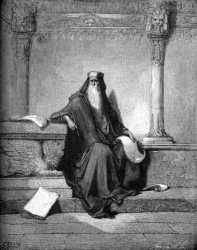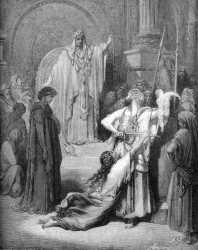Solomon
"Peaceful." David's second son by Bathsheba, i.e., the first after their legal marriage.1 He succeeded his father on the throne in early manhood, probably about sixteen or eighteen years of age. Nathan, to whom his education was entrusted, called him Jedidiah, i.e., "beloved of the Lord.2 He was the first king of Israel "born in the purple." His father chose him as his successor, passing over the claims of his elder sons: "Assuredly Solomon my son shall reign after me." His history is recorded in 1 Kings 1-11 and 2 Chr. 1-9. His elevation to the throne took place before his father's death, and was hastened on mainly by Nathan and Bathsheba, in consequence of the rebellion of Adonijah.3 During his long reign of forty years the Hebrew monarchy gained its highest splendor. The first half of his reign was, however, by far the brighter and more prosperous; the latter half was clouded by the idolatries into which he fell, mainly from his intermarriages.4
Before his death David gave parting instructions to his son.5 As soon as he had settled himself in his kingdom, and arranged the affairs of his extensive empire, he entered into an alliance with Egypt by the marriage of the daughter of Pharaoh of whom, however, nothing further is recorded. He surrounded himself with all the luxuries and the external grandeur of an Eastern monarch, and his government prospered. He entered into an alliance with Hiram, king of Tyre, who in many ways greatly assisted him in his numerous undertakings.
For some years before his death David was engaged in the active work of collecting materials7 for building a temple in Jerusalem as a permanent abode for the ark of the covenant. He was not permitted to build the house of God;8 that honor was reserved to his son Solomon.
After the completion of the temple, Solomon engaged in the erection of many other buildings of importance in Jerusalem and in other parts of his kingdom. For the long space of thirteen years he was engaged in the erection of a royal palace on Ophel.9 It was 100 cubits long, 50 broad, and 30 high. Its lofty roof was supported by forty-five cedar pillars, so that the hall was like a forest of cedar wood, and hence probably it received the name of "The House of the Forest of Lebanon." In front of this "house" was another building, which was called the Porch of Pillars, and in front of this again was the "Hall of Judgment," or Throne-room,10 "the King's Gate," where he administered justice and gave audience to his people. This palace was a building of great magnificence and beauty. A portion of it was set apart as the residence of the queen consort, the daughter of Pharaoh. From the palace there was a private staircase of red and scented sandal wood which led up to the temple.
Solomon also constructed great works for the purpose of securing a plentiful supply of water for the city.11 He then built Millo (LXX., "Acra") for the defense of the city, completing a line of ramparts around it.12 He erected also many other fortifications for the defense of his kingdom at various points where it was exposed to the assault of enemies.13 Among his great undertakings must also be mentioned the building of Tadmor in the wilderness as a commercial depot, as well as a military outpost.
During his reign Palestine enjoyed great commercial prosperity. Extensive traffic was carried on by land with Tyre and Egypt and Arabia, and by sea with India and the coasts of Africa, by which Solomon accumulated vast stores of wealth and of the produce of all nations.14 The royal magnificence and splendor of Solomon's court were unrivaled. He had seven hundred wives and three hundred concubines,15 an evidence at once of his pride, his wealth, and his sensuality. The maintenance of his household involved immense expenditure. The provision required for one day was "thirty measures of fine flour, and threescore measures of meal, ten fat oxen, and twenty oxen out of the pastures, and an hundred sheep, beside harts, and roebucks, and fallow-deer, and fatted fowl."16
Solomon's reign was not only a period of great material prosperity, but was equally remarkable for its intellectual activity. He was the leader of his people also in this uprising amongst them of new intellectual life. "He spake three thousand proverbs: and his songs were a thousand and five. And he spake of trees, from the cedar tree that is in Lebanon even unto the hyssop that springeth out of the wall: he spake also of beasts, and of fowl, and of creeping things, and of fishes."17
His fame was spread abroad through all lands, and men came from far and near "to hear the wisdom of Solomon." Among others thus attracted to Jerusalem was "the queen of the south,"18 the queen of Sheba, a country in Arabia Felix.19 She was filled with amazement by all she saw and heard: "there was no more spirit in her." After an interchange of presents she returned to her native land.
The story of the Judgment of Solomon20 is probably the best known example of his wisdom. Two women of the same house, each the mother of a child, came before the king. One of the babies had been smothered and both claimed the remaining child as her own. Solomon asked for a sword and said, "Divide the living child in two, and give half to the one, and half to the other." The woman whose child it was said, "O my lord, give her the living child, and in no wise slay it." But the other said, "Let it be neither mine nor thine, but divide it." Solomon declared the first woman the true mother.
As Solomon grew older, his wives turned him away from the God of Israel and after their own national deities, such as Ashtoreth and Moloch and Chemosh.21 Solomon did not cease to offer the usual sacrifices in the temple at the great feasts, but his worship became merely formal. This brought upon him the divine displeasure. His enemies, among whom Hadad of Edom, Rezon of Zobah, and Jeroboam, prevailed against him,22 and one judgment after another fell upon the land. And now the end of all came, and he died, after a reign of forty years, and was buried in the city of David; and his son Rehoboam reigned in his place.23
❧
References
Notes
- 2 Sam. 12.
- 2 Sam. 12:24, 25.
- 1 Kings 1:5-40.
- 1 Kings 11:1-8; 14:21, 31.
- 1 Kings 2:1-9; 1 Chr. 22:7-16; 28.
- 1 Kings 3:1.
- 1 Chr. 29:6-9; 2 Chr. 2:3-7.
- 1 Chr. 22:8.
- 1 Kings 7:1-12.
- 1 Kings 7:7; 10:18-20; 2 Chr. 9:17-19.
- Eccl. 2:4-6.
- 1 Kings 9:15, 24; 11:27.
- 1 Kings 9:15-19; 2 Chr. 8:2-6.
- 1 Kings 9:26-28; 10:11, 12; 2 Chr. 8:17, 18; 9:21.
- 1 Kings 11:3.
- 1 Kings 4:22, 23.
- 1 Kings 4:32, 33.
- Matt. 12:42.
- 1 Kings 10:1-13; 2 Chr. 9:1-12.
- 1 Kings 3:16–28.
- 1 Kings 11:4-8; 2 Kings 23:13.
- 1 Kings 11:14-22, 23-25, 26-40.
- 1 Kings 11:42-43.
Source
- Easton, M.G. (1897). Easton's Bible Dictionary. New York: Harper & Brothers.
This article incorporates text from Easton’s Bible Dictionary (1897) by M.G. Easton, which is in the public domain.

